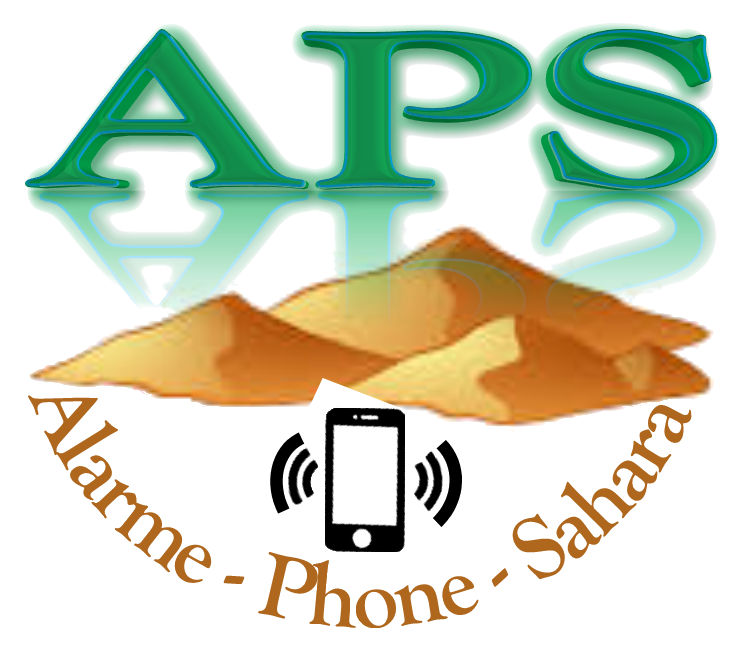Impressions from the Agadez region from May to August 2024
By repealing Law 2015-036 in November 2023, the state of Niger has taken a major step towards restoring freedom of movement on the exile and migration routes. One of the visible results is that many people are travelling now rather freely, without having to fear the usual reprisals. On the other hand, the Maghreb states, encouraged by the policy of the EU states, are practising mass arrests, pullbacks, pushbacks and mass deportations against people on the move on an increasing scale. In April 2024, the Tunisian, Algerian and Libyan governments launched a new Maghreb alliance with the avowed aim of cracking down on the arrival of people on the trans-Saharan routes through Niger, in close coordination with European players. Those who pay the price are the people who are deported under brutal conditions, in the worst cases with fatal consequences, and who are sometimes abandoned in the desert regions of border areas.
At least 19798 people plus an unspecified number were deported from Algeria to Niger from the beginning of 2024 until 24 August 2024. Since recently, forces in Libya have also begun deporting people to Niger in large numbers.
Many of those deported remain stranded in various localities in the Agadez region of northern Niger in precarious conditions. They often lack the means to continue on the migration route, and returning to their countries of origin is also proving difficult, even for those who say they want to return because they see no other prospects.
It should also be borne in mind that during the period from May to August 2024, towns in the north of Niger first suffered from abnormally hot weather during the drought and then from flooding caused by abnormally heavy rainfall.
The climate crisis is already a reality and People on the Move, as well as the local population in Niger, are among those most directly affected by its consequences.
Overview of the situation in Agadez, Arlit, Dirkou and Assamaka between May and August 2024:
Arlit
The town of Arlit in Niger lies on the route between the city of Agadez and the Niger-Algerian border. As a result, the town is frequented by people on their way to migrate, but also by people deported from Algeria. For many of them, Arlit is the first stop after leaving the border village of Assamaka, where they end up after being deported. In Arlit, the IOM maintains a reception centre for so-called ‘voluntary’ returns to countries of origin, but many migrants, especially victims of deportation, remain stranded in Arlit without access to IOM facilities and forced to survive in precarious shelters.
Cry of Alarm, Niger concerning migrant women living in misery and under daily threat
We are very concerned about the situation of migrants from Sierra Leone who have been waiting for months in Arlit. Where they live, in a transport company garage, we met a group of 14 women and 20 children who are still unable to benefit from IOM aid structures.
In a video, one of them describes her precarious living conditions: They live in the street, they don't have enough to eat or drink, they are exhausted, they have no medical care and even less hygiene, and they are afraid. Fear for their own safety, but above all for that of their children. She says that the women are threatened and attacked by men, even with knives, who sexually harass them and even try to rape them.
The APS whistleblower in Arlit also reports with concern that children can be seen at all hours in the town. This can be dangerous for children - especially girls. Families are exposed to everything without protection.
With a few donations of clothing, food and hygiene items, APS was able to help the group at the beginning of April. But it wasn't enough for long. Their days are punctuated by begging.
The Sierra Leonean woman repeats several times: ‘We are suffering so much. Please, we need help’! The desperation is obvious. When asked what they want now, she replies that they want to return to Sierra Leone: ‘We don't have the courage to go on. [...] Our children are going to die slowly’.
On 23 July, the situation in Arlit was highlighted by a violent sandstorm that hit the IOM camp in Arlit, Niger, as reported by the Refugees in Libya organisation. At the same time, it was very hot, with temperatures not dropping below 40-45 degrees.
Interview with a Sierra Leonean migrant in Arlit:
"(...) We come from Sierra Leone. We live in the street, we live here in the street. Our situation? We're suffering a lot. We have no food. We have no water. No soap. No buckets. No mats. Nothing to eat. We have a lot of trouble. We have lots of children. (...) So we need help, we need someone to help us. Some boys are going to rape us during the night. They're going to hurt us. So please, brothers and sisters, we need help for everyone!
We are suffering so much outside. (...) We have no clothes to wear. (...) Our children have to go and beg for food. (...) We always have to beg for food.
Some boys go out at night to ask (...), so I say we're not in a (...), we're migrants, we need help.
Then a boy will pull out a knife and say ‘If you don't agree to be raped, I'll shoot you’. So you shout ‘help’, then someone will rescue us."
"(...) One organisation that helps us is APS. They help us with food, soap, biscuits, so many things. At the time, they were the only organisation helping us. (...) It was for a month, until they finished. Once they've finished, all we do is beg for food. (...) Look at our clothes, we have nothing to wear.
(...) It's all finished! You see, every slipper, this one, we beg for it before we get it!
(...) Our condition, our colour, look at our faces! (...) Look at our condition, our body! Anyone who sees this video, we need help!
(...) We want to return to our country. (...) We are suffering so much that we don't have the courage to continue this journey. No money, it's all over for the road. No help, that's the problem.
(...) We're sick. When you've got that, who helps with the medicine? For everything! Our children are dying! We're dying slowly! (...) We need more help: medicine, treatment, food - that's all we need! (...)"
Video of Sierra Leonean migrant women with their children in a garage in Arlit that serves as their shelter.
"(...) ’ I'm not giving these clothes to my children’ (...) ’ No toilets, infections, scratching, so many things’ (...) ’ Men come to rape at night. All night long. So if you don't agree, I'll kill you! Outside and on this side - the embarrassment is too great.’ (...) ’ We need food, soap, everything, even water!’ (...) ’ Look at my children! (...) Health problems, you don't see a doctor! (...) There's no good medicine for that.’ (...)"
Agadez
Agadez is the capital of the large area of northern Niger and a major crossroads for trans-Saharan travel. According to Alarme Phone Sahara (APS), the situation in the town of Agadez is difficult, as many migrants, often deported from Algeria, are stranded there without access to IOM facilities or the means to continue their journey.
On the one hand, the IOM, as part of its so-called ‘voluntary return’ programme, evacuates migrants with flights from Agadez, but does not take charge of certain groups even though they have expressed the wish to return to their country of origin.
For example, there are many Sierra Leoneans living in ghettos in both Agadez and Arlit, and hundreds of people living in the vicinity of the IOM without access to it.
There are various reasons why Sierra Leoneans and others remain stranded in Agadez: Many of them were deported from Algeria in deportation convoys after raids and find themselves in Niger empty-handed. Some were quickly pushed back just after arriving in Algeria. Others have arrived in Agadez on their migration route, but lack the means to continue on their way.
The Alarme Phone Sahara co-ordinating office also points out that there are always people registered with the IOM, but who have no access to their camp and remain on the streets for lack of available places.
They also expressed their concern that this precarious situation could lead to tensions between migrants and members of the local population.
In addition, they note that the poor living conditions expose people on the move to serious health risks.
The members of the Alarme Phone Sahara team are regularly confronted with very sick migrants and, with their limited means, undertake to seek medical care. The precarious medical situation also leads to deaths among the most vulnerable. The Alarme Phone Sahara team reports, among other things, that 10 children have died from measles infections.
In order to find a solution for the Sierra Leoneans stranded in Agadez who wish to return to their country of origin, censuses have been carried out to push the Sierra Leonean authorities to allow the rapid return of their nationals.
Dirkou, Kaouar desert area: A precarious situation for people on the move and a new wave of deportations from Libya
The town of Dirkou, as well as Bilma, Latai and Siguidine in the Kaouar desert area, are frequented by people on their way to Libya, but also by people on their way back.
To some extent, movement in this area of northern Niger has become easier thanks to the repeal of law 2015-036 and the abandonment of the widespread criminalisation of migration. On the other hand, many migrant people in the area find themselves in very precarious conditions and need support and assistance to meet their needs for food and other basic needs according to Alarme Phone Sahara's team of whistleblowers.
Statement by a migrant presently stuck in Dirkou :
„(…) Somebody is here, but they give no water, no eat, no drink, no anything.
(…) Sometimes, if something comes here, they don’t give it to us, but to other people and we are not happy. (…) We are still facing suffering, and it is not good. (…) Here is like our home, but we are not feeling fine, we are like a slave.“
According to APS whistleblowers, the local IOM reception centre takes care of around fifty people, but hundreds of people can only try to make ends meet on the streets in the surrounding area. In the worst cases, the tense situation can lead to violent clashes between members of groups of different origins.
What's more, according to the APS whistleblower team in the Kaouar area, deportations from Libya to Niger have begun on a massive scale: on 18 July 2024, 463 Nigerien men arrived in Dirkou as a result of a mass deportation from Libya carried out by General Khalifa Haftar's forces. A temporary site outside the town was set up to receive them.
The 463 men were able to leave Dirkou with transport to Agadez organised by the IOM, but according to local sources, there are a number of around 10,000 people who have been arrested in Libya in order to deport them.
As a result, we can expect a precarious humanitarian situation between Dirkou and Agadez in the days, weeks and months to come.
Assamaka, Niger-Algeria border
At Assamaka on the Niger-Algeria border, the arrival point for people deported in convoys from Algeria, the situation remains precarious, given the large number of people deported (at least 19798 plus an unspecified number deported from the beginning of 2024 until 24 August 2024) and the violent and inhumane conditions in which they are deported. People deported in ‘official convoys’ are accompanied by the Algerian Red Crescent and transported to the village of Assamaka and from there to Arlit or Agadez. Those deported in ‘unofficial convoys’ are always dropped off at ‘Point Zero’, 15km from the village of Assamaka, and forced to fend for themselves on foot. According to the Alarme Phone Sahara team in Assamaka, they are the only ones who regularly travel to ‘Point Zero’ with their tricycles to pick up deportees, sometimes supported by Médecins Sans Frontières (MSF) to transport sick and injured people to the hospital ward.
Assistance for people deported to Assamaka with the tricycle of Alarme Phone Sahara:
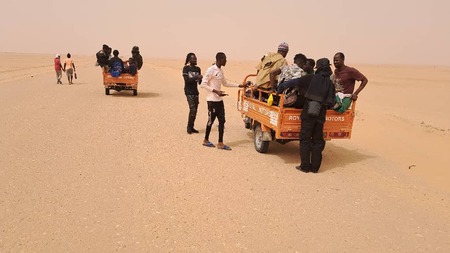
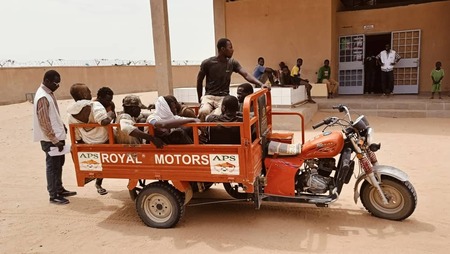
Transporting people from "Point Zero" to the village... ...and to the hospital ward of Assamaka.
On the ground, access to basic necessities continues to be lacking. Given the intense heat, there is a shortage of water, with a 25-litre jerrycan costing 300 CFA francs and a bottle of drinking water costing 500 CFA francs, of which a person can consume 3 or 4 a day to quench their thirst. François Ibrahim of the local Alarme Phone Sahara team reports that the water tower supplying the village has broken down, with no information about its repairs.
According to the Alarme Phone Sahara team, an additional challenge is the recent arrival in Assamaka of groups of people in distress from the north and centre of Nigeria, particularly women with children. They are supposedly hoping that Assamaka will provide them with access to the structures of the IOM camp and the Italian NGO COOPI, which is active there.
As the IOM, by virtue of its mandate, only considers itself responsible for people deported from Algeria who arrive in Assamaka, these groups of people remain on the streets and have to make do by begging.
This situation is exacerbating the already difficult and inadequate food supply situation in Assamaka. The Agadez-based newspaper ‘Air Info’ is already talking about an imminent humanitarian crisis for people arriving in Assamaka totally destitute.
Alarme Phone Sahara calls on international organisations, the Nigerien government and European institutions to rapidly put in place the necessary means to deal with the humanitarian crisis once again looming in Assamaka and to create decent conditions both for those deported from Algeria and for those who, for want of better prospects, travel to Assamaka in the hope of receiving humanitarian aid.
Furthermore, the current situation in Assamaka demonstrates once again the need to find political solutions both to the distress of the deportees, caused by the repressive border regime, and to the massive poverty caused by the unjust political and economic conditions in the countries of the Sahel and Sahara region.
François Ibrahim of the Alarme Phone Sahara Assamaka team had this to say:
"To combat this situation, the so-called democratically elected representatives need to understand that it's all very well to be elected, but they also need to listen and understand why people are leaving their homes. The solution is for politicians to find work for the young men and women who are leaving in search of a better life.“
Article on Senegalese migrants who demand their return as they suffer in Assamaka:
Deaths in the desert zone on the Algerian-Nigerian border
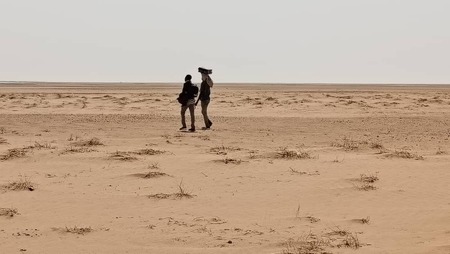
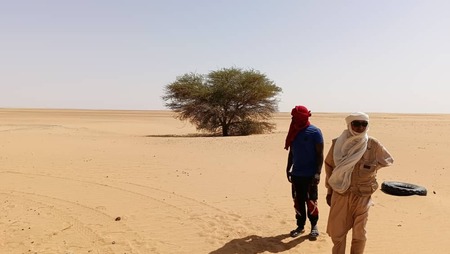
People wandering in the desert in desperate conditions... ...the Alarme Phone Sahara team searching for them.
François Ibrahim also reports that, in addition to the 5 people who died after deportation from Algeria between 9 and 13 May 2024, two others died in the vast desert area on the Algerian-Nigerien border between Assamaka and In Guezzam in the same month.
According to Ibrahim, the two brothers had left Assamaka to return to Algeria, from where they had been deported, along with their third brother who survived.
The Alarme Phone Sahara team in Assamaka was alerted by another brother of the three who had got lost in the desert area and took the initiative to hire a vehicle and set off on a rescue mission. They were able to find and rescue one of the three brothers, but unfortunately the other two had already lost their lives, exposed to the extreme conditions of the desert.
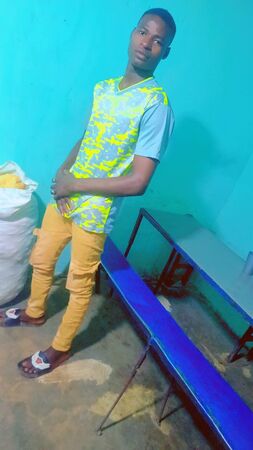

R.I.P. Two brothers who died in the desert near Assamaka in May 2024
What happened in Assamaka shows that mass and brutal deportations from Algeria put the people concerned in mortal danger. This situation is exacerbated by the precarious and unbearable living conditions in Assamaka, where deportees regularly set off, sometimes on foot, to return to Algeria and escape this desperate situation.
In response to this situation, Alarme Phone Sahara has begun to initiate meetings with other associations and NGOs in Assamaka to counter this tragedy of pedestrian deaths in the desert border zone between Niger and Algeria.
Testimony of deportations from Algeria to the desert near Assamaka, border of Niger:
Two men deported from Algeria in a ‘non-official’ convoy who arrived in Assamaka on 28 July 2024:
Video 1:
’I'm from Burkina Faso. I worked in Algeria. It was in Algeria that I broke [my leg]. I fell from the third floor. The Algerian police came and took me to hospital for treatment. I was in hospital fort wo months. They took me for deportation. They brought me there so that I return to Burkina Faso.’
’If they catch you, they'll take everything you've got. Your phone, they take everything. If you have a phone, they'll take it. Money, they take everything. If you have money, if you have a phone, the police leave nothing with you. They take everything.’
‘They're not going to leave you so that your foot will end up well even, they're just going to take you .’
Video 2 :
‘I fell inside that car. The Algerians didn't even consider me, they just took a bandage to tie [my foot], put some medicine on me and left me like that. They took us as far as to the desert. 15 kilometres from the Niger border, they left the people there, and here we are, walking on foot.
Continuation of mass deportations from Algeria to Niger
Mass deportations from Algeria to Niger and the Niger border also continue in May, June, July and August 2024:
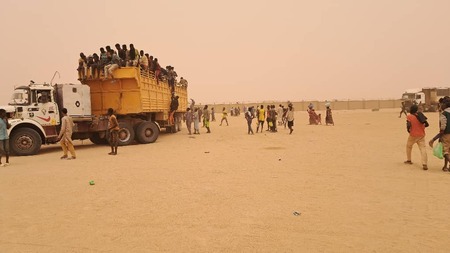
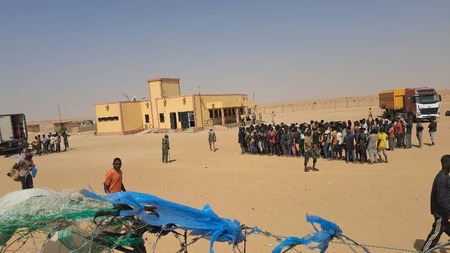
Arrival of "official" deportation convoy, July 2024 People queuing at police station after deportation. August 2024
31.05.2024: 131 people deported in an ‘unofficial’ convoy and dropped off at ‘Point Zero’ to walk to Assamaka on foot. Among them 29 nationals from Nigeria, 19 from Mali, 18 from Guinea Conakry, 18 from Sudan, 12 from Sierra Leone, 11 from Senegal, 5 from Côte d'Ivoire, 7 from Cameroon, 6 from Burkina Faso, 2 from Benin, 2 from Chad, one from Togo and one from Egypt.
31.05.2024: Arrival of an official deportation convoy at Assamaka, with 351 Niger nationals, including 7 women, 6 under-age girls, 21 under-age boys and 317 men.
03.06.2024: Arrival of an official deportation convoy with 442 nationals of Niger, including 49 women, 59 under-age girls and 63 under-age boys.
03.06.2024: 35 people deported in an ‘unofficial’ convoy and dropped off at ‘Point Zero’ to walk to Assamaka. Among them 12 people from Guinea Conakry, 10 from Côte d'Ivoire, 7 from Mali, two from Nigeria, one from Burkina Faso, one from Senegal, one from Benin and one from Sierra Leone.
05.06.2024: 148 people, including 13 women, 2 minor boys, one minor girl and 132 men, deported in an ‘unofficial’ convoy and dropped off at ‘Point Zero’ to walk to Assamaka. Among them 44 people from Guinea Conakry, 39 from Mali, 13 from Liberia, 8 from Benin, 6 from Burkina Faso, 4 from Cameroon, 4 from Côte d'Ivoire, 3 from Ghana, 5 from Gambia, 9 from Nigeria, 4 from Sierra Leone, 3 from Senegal, 2 from Sudan, 2 from Togo, one person from Chad and one from Somalia.
05.06.2024 : Arrival of an official deportation convoy with 459 people, including 350 men, 28 women, 42 boys and 39 girls.
08.07.2024: 192 people deported in an ‘unofficial’ convoy and dropped off at ‘Point Zero’ to walk to Assamaka. Among them 64 people from Guinea Conakry, 28 from Mali, one from Liberia, 14 from Benin, 16 from Burkina Faso, 24 from Cameroon, 13 from Côte d'Ivoire, 2 from Gambia, 3 from Nigeria, 16 from Sierra Leone, 10 from Senegal and one person from Togo.
227 people, with no details of their origin, were deported in a second ‘unofficial’ convoy on the same day.
08.07.2024: Arrival of an official deportation convoy with 564 people, including 31 adult women, 46 under-age girls, 49 under-age boys and 438 adult men.
18.07.2024: 158 people, with no details of their origin, deported in an ‘unofficial’ convoy and dropped off at ‘Point Zero’ to walk to Assamaka.
20.07.2024: 27 people, without details of their origin, deported in an ‘unofficial’ convoy.
20.07.2024: Arrival of an official deportation convoy with 467 people, including 17 adult women, 32 under-age girls, 48 under-age boys and 370 adult men.
24.07.2024: 170 people deported in an ‘unofficial’ convoy and dropped off at ‘Point Zero’ to walk to Assamaka. Among them 43 nationals of Guinea Conakry, 47 from Mali, one from Benin, 12 from Burkina Faso, 22 from Cameroon, 18 from Côte d'Ivoire, 4 from Gambia, 7 from Nigeria, 9 from Sierra Leone, 3 from Senegal, 3 from Ghana, 2 from Guinea Bissau, one from Chad and one from Togo.
28.07.2024: An unspecified number of people, with no details of their origin, deported in an ‘unofficial’ convoy.
03.08.2024: 45 people deported in an ‘unofficial’ convoy and dropped off at ‘Point Zero’ to walk to Assamaka. Among them 6 nationals of Guinea Conakry, 12 from Mali, 3 from Benin, 8 from Cameroon, 6 from Côte d'Ivoire, 2 from Gambia, 4 from Nigeria and 4 from Senegal.
05.08.2024: 99 people deported in an ‘unofficial’ convoy and dropped off at ‘Point Zero’ to walk to Assamaka. Among them 25 people from Guinea Conakry, 21 from Mali, 10 from Benin, 14 from Cameroon, 20 from Côte d'Ivoire, 3 from Burkina Faso, 2 from Gambia, 3 from Senegal and one person from Ghana.
09.08.2024: Arrival of an official deportation convoy with 410 people, including 24 adult women, 33 underage girls, 45 underage boys and 308 adult men.
11.08.2024: 564 people deported in an ‘unofficial’ convoy and dropped off at ‘Point Zero’ to walk to Assamaka. Among them 173 nationals of Guinea Conakry, 142 from Mali, 7 from Benin, 12 from Burkina Faso, 41 from Cameroon, 35 from Côte d'Ivoire, 34 from Nigeria, 21 from Sierra Leone, 18 from Senegal, 6 from Ghana, 25 from Chad, 48 from Sudan, one person from Somalia and one from Togo.
12.08.2024: Arrival of an official deportation convoy with 981 people, including 44 adult women, 50 underage girls, 53 underage boys and 834 adult men.
24.08.2024: People deported in an ‘unofficial’ convoy and dropped off at ‘Point Zero’ to walk to Assamaka. The Alarme Phone Sahara team picked up the injured and sick from Point Zero and took them to the Assamaka dispensary in two round trips. According to their observations, one man was left with two fractures in his left leg following a vehicle accident. The others reported that the injuries had been inflicted during their arrest by the Algerian police. One man was found seriously ill and almost unconscious, in severe pain. Another one was in a state of psychological crisis and could not speak.
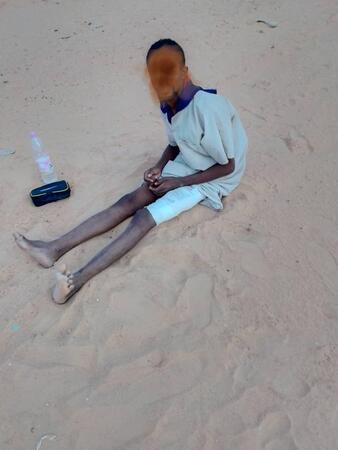
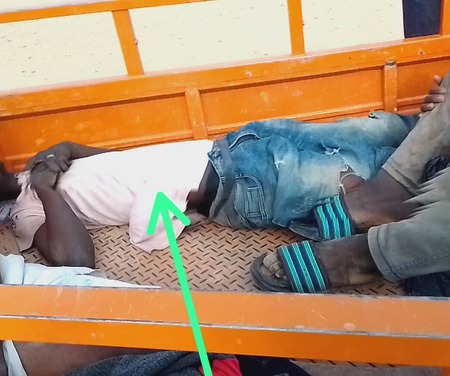
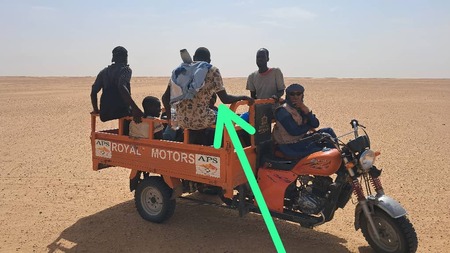
Man with fractures in his leg, man seriously ill and man in psychological crisis after deportation convoy of 24 August 2024
Alarme Phone Sahara condemns the violent and, in the worst cases, fatal treatment of migrants by the Algerian security forces, and calls for :
- No more deaths!
- Dignified and sufficient humanitarian aid for all migrants and refugees stranded in Arlit, Assamaka, Agadez, Dirkou and elsewhere!
- An end to police persecution and violence against migrants in Algeria!
- An immediate end to mass deportations and pushbacks to deserts and border areas!
- An end to raids, arbitrary arrests and police violence!
- Respect for the human rights of all people on the move, migrants, refugees and asylum seekers!
- The possibility of return in decent conditions for those who wish to return of their own free will!
- The opening of safe humanitarian routes for all people on the move, migrants, refugees and asylum seekers across the Sahara desert and the Mediterranean!
- The abolition of deportation and migration control agreements between the countries of the Sahel-Saharan region and the members of the EU in favour of a policy based on the protection of life, rights, security, human dignity and the free movement of all people on the move!
